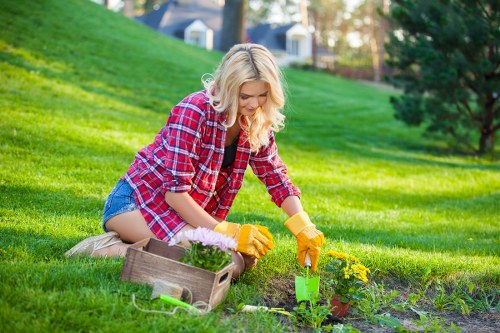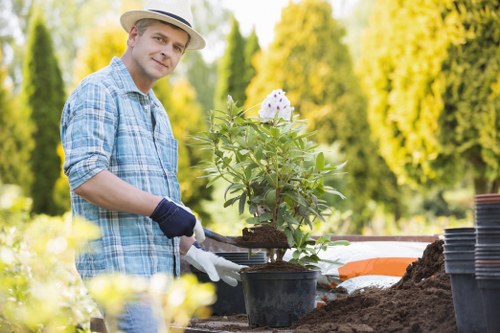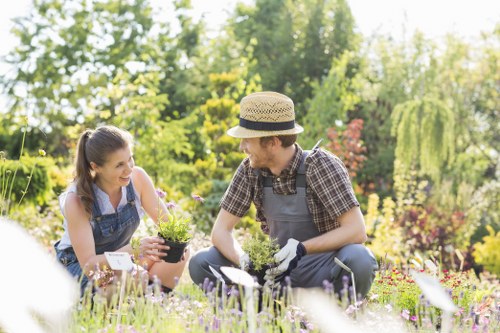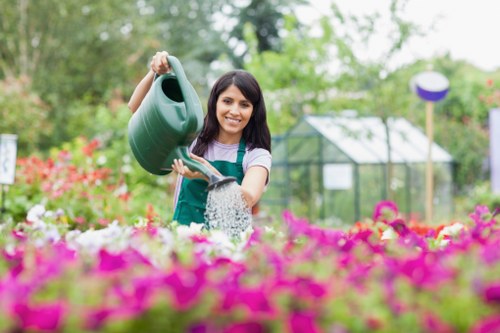Comprehensive Guide to Garden Maintenance in Edmonton

Maintaining a beautiful garden in **Edmonton** requires understanding the unique climate and soil conditions of the area. With its harsh winters and vibrant summers, Edmonton presents both challenges and opportunities for garden enthusiasts. Proper garden maintenance not only enhances the aesthetic appeal of your outdoor space but also promotes healthy plant growth and sustainability.
One of the first steps in effective garden maintenance is selecting the right plants that can thrive in Edmonton’s climate. Opting for native species or those well-suited to the region can significantly reduce maintenance efforts and increase the garden’s resilience against pests and diseases.
Regular upkeep tasks, such as pruning, weeding, and fertilizing, are essential to keep your garden looking its best. By incorporating these practices into your routine, you can ensure that your garden remains vibrant and healthy throughout the year.
Understanding Edmonton's Climate for Gardening

Edmonton experiences a **continental climate**, characterized by cold winters and warm summers. This climate significantly influences gardening practices, as it dictates the growing seasons and the types of plants that can be successfully cultivated.
The short growing season in Edmonton means that gardeners must plan carefully to maximize the productivity and beauty of their gardens. Utilizing techniques such as raised beds, greenhouses, and cold frames can extend the growing season and protect plants from extreme weather conditions.
Additionally, understanding the local weather patterns, including precipitation levels and temperature fluctuations, is crucial for effective garden maintenance. This knowledge helps in selecting appropriate irrigation systems and scheduling planting and harvesting times to align with Edmonton’s climate.
Soil Preparation

Preparing the soil is a fundamental aspect of garden maintenance in Edmonton. The region’s soil tends to be clay-heavy, which can impede drainage and root growth. To improve soil quality, incorporate organic matter such as compost or well-rotted manure.
Testing the soil’s pH level is also important, as it affects nutrient availability to plants. Most plants thrive in slightly acidic to neutral soil, so adjusting the pH as needed can enhance plant health and yield.
Additionally, implementing crop rotation and cover cropping can prevent soil depletion and reduce the risk of soil-borne pests and diseases, contributing to a more sustainable garden ecosystem.
Planting Tips

Selecting the right plants is crucial for a successful garden in Edmonton. Opt for hardy varieties that can withstand the region’s temperature extremes and shorter growing seasons.
Planting at the appropriate time, typically after the last frost date in spring, ensures that plants establish well before the onset of extreme summer heat or early autumn cold.
Utilizing companion planting techniques can also promote healthy plant growth by enhancing pollination, deterring pests, and improving soil fertility. This method fosters a more balanced and resilient garden environment.
Seasonal Garden Maintenance Tasks

Effective garden maintenance in Edmonton involves adapting your care routine to the changing seasons. Each season presents its own set of challenges and opportunities that require specific maintenance strategies.
- Spring: Focus on soil preparation, planting, and early pest management.
- Summer: Emphasize watering, weed control, and monitoring for pests and diseases.
- Fall: Prepare plants for winter, conduct composting, and clean up garden debris.
- Winter: Manage snow accumulation, protect sensitive plants, and plan for the upcoming gardening season.
Watering Strategies
Proper **watering** is essential for maintaining a healthy garden, especially during Edmonton’s warm summer months. Implementing efficient watering systems, such as drip irrigation or soaker hoses, can conserve water and ensure that plants receive consistent moisture.
Timing is also critical; watering early in the morning reduces evaporation and allows plants to dry before evening, minimizing the risk of fungal diseases. Additionally, mulching around plants helps retain soil moisture and regulate temperature, further enhancing water efficiency.
Monitoring soil moisture levels and adjusting watering schedules based on weather conditions can optimize water usage and support robust plant growth.
Pest Control
Managing pests is a key component of garden maintenance in Edmonton. Implementing integrated pest management (IPM) strategies can effectively control pest populations while minimizing the impact on beneficial insects and the environment.
Regularly inspecting plants for signs of pests and diseases allows for early intervention. Utilizing natural predators, such as ladybugs and lacewings, can help keep pest populations in check without the need for chemical treatments.
Additionally, maintaining plant health through proper watering and soil management can make plants more resistant to pest infestations, reducing the overall need for pest control measures.
Essential Tools for Garden Maintenance
Having the right tools is vital for efficient garden maintenance. Investing in quality tools can make tasks easier and more enjoyable, while also ensuring the longevity of your garden infrastructure.
- Pruners and Shears: Essential for trimming and shaping plants.
- Spades and Shovels: Necessary for digging, planting, and soil preparation.
- Garden Fork: Useful for aerating soil and turning compost.
- Watering Equipment: Includes hoses, sprinklers, and irrigation systems.
- Gardening Gloves: Protect hands from thorns, dirt, and pests.
Maintaining your garden tools by cleaning and sharpening them after use can prolong their lifespan and ensure they remain effective for all your gardening needs.
Choosing the Right Plants for Edmonton Gardens
Selecting plants that are well-suited to Edmonton’s climate is crucial for a thriving garden. Native plants, such as coneflowers, black-eyed Susans, and hostas, are adapted to the local conditions and require less maintenance.
Additionally, incorporating a mix of perennials and annuals can provide continuous blooms and greenery throughout the growing season. Perennials offer long-term structure, while annuals add vibrant color and variety each year.
Consider factors such as sunlight exposure, soil type, and water requirements when choosing plants to ensure they thrive in your specific garden environment.
Lawn Care in Edmonton
A well-maintained lawn is a cornerstone of any beautiful garden. In Edmonton, **lawn care** involves regular mowing, fertilizing, and aerating to promote healthy grass growth.
- Mowing: Keep grass at an optimal height to encourage deep root development and reduce weed growth.
- Fertilizing: Apply appropriate fertilizers in spring and fall to provide essential nutrients.
- Aerating: Improve soil aeration and reduce compaction by aerating the lawn annually.
- Weed Control: Implement pre-emergent and post-emergent weed control methods to maintain a pristine lawn.
Regular maintenance practices not only enhance the appearance of your lawn but also contribute to the overall health and sustainability of your garden.
Landscaping Tips for a Beautiful Garden
Effective landscaping can transform your garden into a stunning outdoor oasis. By thoughtfully arranging plants, structures, and pathways, you can create a harmonious and functional garden space.
Incorporate elements such as **raised beds**, pergolas, and water features to add visual interest and functionality. Utilizing diverse plant textures, colors, and heights can create depth and enhance the overall aesthetic appeal.
Additionally, consider the flow of traffic and accessibility when designing your garden layout to ensure it is both beautiful and practical for everyday use.
Common Garden Problems and Solutions
Gardening in Edmonton can present various challenges, from dealing with pests to managing soil quality. Addressing these common problems proactively can help maintain a healthy and vibrant garden.
- Pest Infestations: Use natural predators and organic pest control methods to manage pest populations.
- Soil Compaction: Aerate the soil regularly to improve drainage and root growth.
- Weed Overgrowth: Implement mulch and manual weeding to keep weeds at bay.
- Plant Diseases: Practice good sanitation and plant selection to minimize disease risks.
Tackling these issues head-on ensures that your garden remains resilient and continues to thrive despite environmental challenges.
Sustainable Gardening Practices
Adopting sustainable gardening practices not only benefits the environment but also contributes to the long-term health of your garden. Implementing techniques such as rainwater harvesting, composting, and using organic fertilizers can enhance sustainability.
- Rainwater Harvesting: Collecting and utilizing rainwater reduces reliance on municipal water sources and conserves water.
- Composting: Recycling garden and kitchen waste into compost enriches the soil and reduces landfill waste.
- Organic Fertilizers: Using natural fertilizers promotes soil health and minimizes chemical usage.
- Mulching: Applying mulch conserves moisture, regulates soil temperature, and suppresses weeds.
By integrating these sustainable practices, you can create an eco-friendly garden that supports biodiversity and minimizes environmental impact.
Professional Garden Maintenance Services in Edmonton
For those seeking expert assistance, numerous professional garden maintenance services are available in Edmonton. These services offer comprehensive care, including landscaping, lawn maintenance, plant selection, and seasonal clean-ups.
Hiring professionals can save time and ensure that your garden receives the specialized attention it needs to thrive. Additionally, they can provide valuable insights and recommendations tailored to your specific garden requirements.
Whether you require regular maintenance or seasonal services, partnering with a reputable garden maintenance company can help you achieve and maintain a beautiful, healthy garden year-round.
Conclusion
Maintaining a garden in Edmonton is a rewarding endeavor that combines **dedication**, knowledge, and the right tools. By understanding the local climate, selecting appropriate plants, and adhering to regular maintenance routines, you can cultivate a thriving and beautiful garden.
Embrace sustainable practices and consider professional services to enhance your gardening experience and ensure long-term success. Whether you are a seasoned gardener or a beginner, Edmonton offers ample opportunities to create and nurture a stunning outdoor space.
Contact us today to learn more about how you can optimize your garden maintenance routine and achieve the garden of your dreams in Edmonton. Book your service now and take the first step towards a flourishing garden that you can enjoy throughout the seasons.

